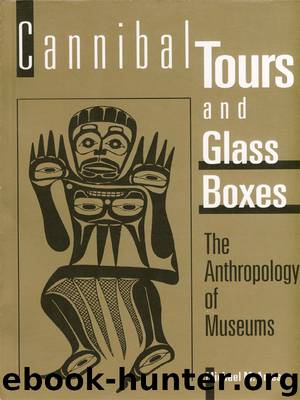Cannibal Tours and Glass Boxes by Ames Michael M

Author:Ames, Michael M.
Language: eng
Format: epub
Tags: Museums and Anthropology
ISBN: 9780774859738
Publisher: University of British Columbia Press
Published: 1992-06-18T16:00:00+00:00
Museum attendance continues to grow, outstripping even – it is claimed – attendance at professional sporting events. So those working in museums can answer loudly and clearly, ‘Yes, museums are necessary, because the people want them!’ But are they necessary for the right reasons? Does the increasing popularity of museums subvert them from their original mission as scholarly institutions, and therefore subvert the work of those employed within? Or, to look at it another way, are those working in museums today, especially ethnologists, adequately trained for the public roles unfolding upon them? In actual fact ethnologists are not trained for many of the duties they are now expected to perform in contemporary museums and galleries, and that is a problem.
Academic ethnologists are also inclined, naturally, to say that their ethnology is also necessary; but in their case they cannot claim it is because the people want it. On the contrary, to the dismay of the profession, ethnology appears to be declining in popularity, among students, in the general population, and – most embarrassing of all – among those whom ethnologists traditionally study (Lurie 1966). Probably one of the greatest shocks an ethnologist can experience -and it seems to be occurring with increasing frequency – is to have the people studied read what was written about them, and complain both stridently and publicly about misinterpretation and distortion. The personal interpretation the ethnographic technique produces makes ethnologists particularly vulnerable to this criticism.
Under the circumstances we had better give more serious attention to the state of our profession, Richard Preston warns (1983:294) in his recent article on the structure of Canadian ethnology: ‘With a promised decline in university entrance populations, inflation, recession, an ungenerous mood on the part of government and … the populace as far as university support is concerned, we are faced with the fact that the boom is finished, and strategic withdrawals … from the aspirations and expectations of the past decade must come.’
What has gone wrong? Museums are more popular than ever, though apparently more as status symbols than as the institutions of research and education their curators prefer. The academic version of ethnology, despite unparalleled growth in numbers and in the sophistication of theories and methodologies (Tremblay 1983), appears to be declining in popularity and public respect. Somehow ethnologists are missing the boat; those in museums grumble about their increasingly public role, while those in Academe lament their declining popularity.
Ethnologists who today work in museums and universities were all trained in a context where the importance of research and the principle of scientific freedom were held to be primary values, transcending even the responsibility to respond to public demands. The foundations for these ideas can be traced back to the Renaissance and the ‘educational revolution’ (Parsons and Platt 1973:3) that followed. Scholars have come to assume that the acquisition and free exchange of knowledge is accepted as common practice throughout the civilized world. ‘The unhindered opportunity to conduct research, to freely discuss issues and to publish ideas, was
Download
This site does not store any files on its server. We only index and link to content provided by other sites. Please contact the content providers to delete copyright contents if any and email us, we'll remove relevant links or contents immediately.
Cecilia; Or, Memoirs of an Heiress — Volume 1 by Fanny Burney(32548)
Cecilia; Or, Memoirs of an Heiress — Volume 2 by Fanny Burney(31947)
Cecilia; Or, Memoirs of an Heiress — Volume 3 by Fanny Burney(31932)
The Great Music City by Andrea Baker(31917)
We're Going to Need More Wine by Gabrielle Union(19035)
All the Missing Girls by Megan Miranda(15962)
Pimp by Iceberg Slim(14489)
Bombshells: Glamour Girls of a Lifetime by Sullivan Steve(14058)
For the Love of Europe by Rick Steves(13933)
Talking to Strangers by Malcolm Gladwell(13350)
Norse Mythology by Gaiman Neil(13349)
Fifty Shades Freed by E L James(13233)
Mindhunter: Inside the FBI's Elite Serial Crime Unit by John E. Douglas & Mark Olshaker(9324)
Crazy Rich Asians by Kevin Kwan(9280)
The Lost Art of Listening by Michael P. Nichols(7494)
Enlightenment Now: The Case for Reason, Science, Humanism, and Progress by Steven Pinker(7306)
The Four Agreements by Don Miguel Ruiz(6745)
Bad Blood by John Carreyrou(6611)
Weapons of Math Destruction by Cathy O'Neil(6267)
